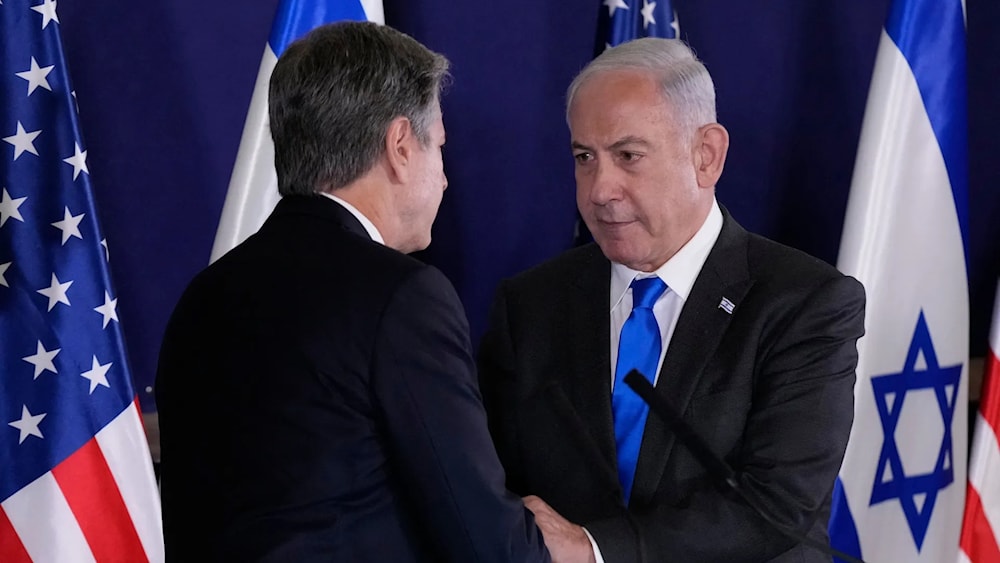US pressured "Israel" to implement pauses in Gaza: Axios
Israeli Prime Minister Benjamin Netanyahu agreed to a "limited ceasefire" in the Gaza Strip, but reports suggest that it was pressured into it.
-

Israeli Prime Minister Benjamin Netanyahu shakes hands with Secretary of State Antony Blinken on Oct. 12. (AFP)
Under pressure from the United States, "Israel" agreed to implement "tactical localized humanitarian pauses" in its war on the Gaza Strip within northern Gaza neighborhoods for four hours each day, as disclosed by Israeli and US officials on Thursday.
The decision marks a change in Israeli policy, as it had previously resisted the Biden administration's efforts to implement pauses in the Israeli war on Gaza for humanitarian reasons, according to Axios. Initially, Israeli officials perceived these pauses as a potential route to a ceasefire, which the Israeli public was not inclined toward.
When John Kirby, the spokesperson for the US National Security Council, revealed the Israeli decision earlier on Thursday, Israeli Prime Minister Benjamin Netanyahu's office released a statement downplaying the development, framing it as "something not novel". According to Axios, this demonstrates the political sensitivities that Netanyahu is facing within his coalition and the Israeli public.
'Blinken's call for a humanitarian pause'
In the course of Secretary of State Antony Blinken's visit to occupied Palestine last week, he urged Netanyahu and members of the Israeli war Cabinet to initiate humanitarian pauses in the conflict, facilitating the delivery of aid to Palestinians in northern Gaza.
Publicly, Netanyahu dismissed the request, insisting that a temporary ceasefire would only occur upon the release of Israeli captives. However, behind the scenes, Israeli and US officials claim that Netanyahu was more receptive to the idea. According to a senior Israeli official, when Blinken broached the topic of a temporary pause, there was apprehension in "Israel" that the US was attempting to steer "Israel" toward a trajectory leading to a lasting ceasefire.
Following Blinken's departure, Israeli and US officials engaged in further discussions. US officials explicitly conveyed that they harbored no intention of forcing "Israel" into a ceasefire. They emphasized that the sought-after pauses were aimed at aiding Palestinian civilians on the ground, addressing pressure from Arab nations and within the US, as conveyed by two Israeli officials, reported Axios.
'humanitarian pause on the table, no ceasefire'
After these talks, officials noted that "Israel" felt reassured and consequently initiated the process of formulating a plan for humanitarian pauses, according to Axios, adding that the task of drafting this plan was delegated to the Israeli Occupation Forces.
As per the plan, "Israel" will announce a four-hour window for Palestinian civilians to allegedly access essential supplies like food, water, and medicine. Additionally, they may opt to evacuate and move towards southern Gaza during this period. Israeli officials confirmed that both Netanyahu and Yoav Gallant, the Israeli Security Minister, gave their approval to the plan proposed by the Israeli Occupation Forces (IOF).
Earlier on Thursday, in what the White House called a "step in the right direction," the Israeli occupation will begin to implement 4-hour pauses in Gaza to allow people to "flee hostilities". It is unclear where they are supposed to "flee" considering that they are trapped in a besieged strip.
The pauses, according to White House National Security Spokesperson John Kirby, were the fruit of conversations between American and Israeli officials in the past several days, including conversations between US President Joe Biden and Netanyahu. According to Kirby, the pauses would let people "escape danger", permit the delivery of humanitarian goods, and even serve as a means of freeing captives.
Evidently, what the US really means is that the pauses are there to free the captives that the Resistance is holding. "We've been told by the Israelis that there will be no military operations in these areas over the duration of the pause and that this process is starting today," Kirby explained.
It is worth noting that the last time "Israel" allegedly allowed Palestinians to evacuate, they were welcomed with warplanes that killed them on their way out of the North.
Earlier last month, Hamas’ media office said warplanes struck cars fleeing south, killing more than 70 people. Hamas called on people to disregard the evacuation warning in protest of the Israeli agenda. On that note, medical personnel at hospitals refused to leave, expressing their inability to leave behind patients in need.
This comes after the Israeli occupation army said in a statement that 1.1 million people living in northern Gaza must evacuate within the next 24 hours, hinting at plans to start a much-feared ground invasion of the devastated Strip that has been under nonstop bombing.

 5 Min Read
5 Min Read








